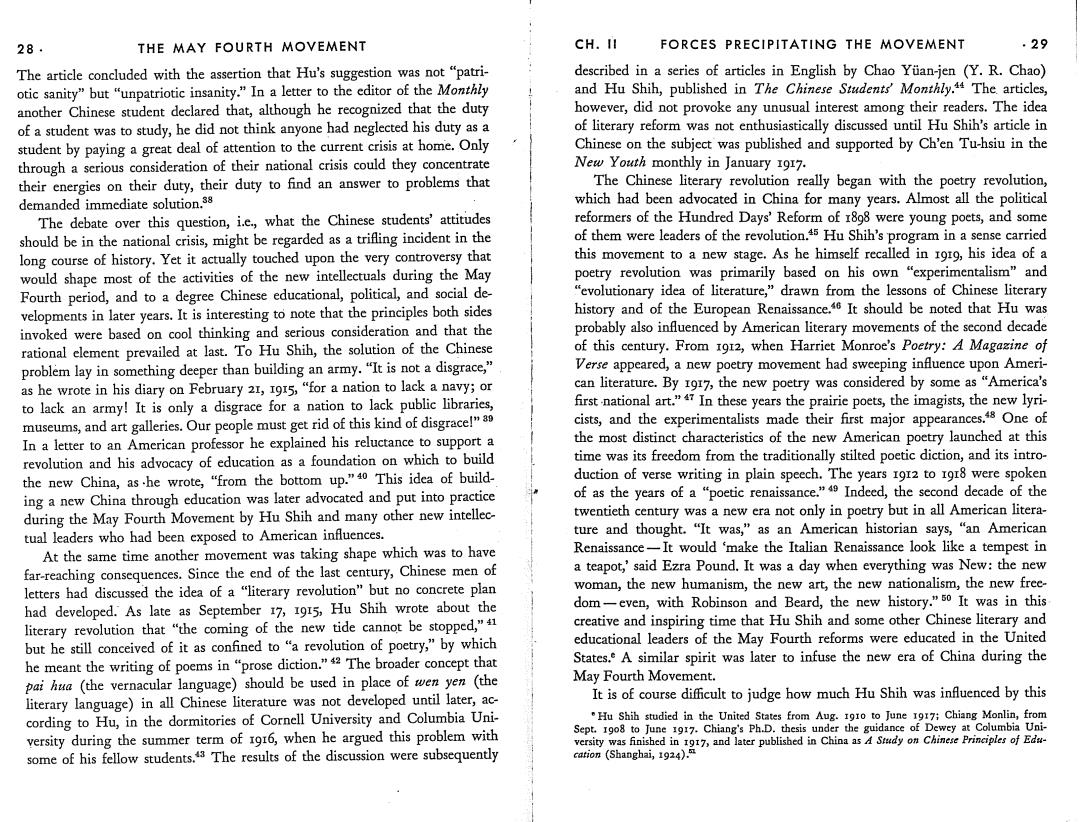
28· THE MAY FOURTH MOVEMENT CH.II FORCES PRECIPITATING THE MOVEMENT .29 The article concluded with the assertion that Hu's suggestion was not "patri- described in a series of articles in English by Chao Yuan-jen (Y.R.Chao) otic sanity"but"unpatriotic insanity."In a letter to the editor of the Monthly and Hu Shih,published in The Chinese Students'Monthly.4 The.articles, another Chinese student declared that,although he recognized that the duty however,did not provoke any unusual interest among their readers.The idea of a student was to study,he did not think anyone had neglected his duty as a of literary reform was not enthusiastically discussed until Hu Shih's article in student by paying a great deal of attention to the current crisis at home.Only Chinese on the subject was published and supported by Ch'en Tu-hsiu in the through a serious consideration of their national crisis could they concentrate New Youth monthly in January I917. their energies on their duty,their duty to find an answer to problems that The Chinese literary revolution really began with the poetry revolution, demanded immediate solution.s8 which had been advocated in China for many years.Almost all the political The debate over this question,i.e,what the Chinese students'attitudes reformers of the Hundred Days'Reform of 1898 were young poets,and some should be in the national crisis,might be regarded as a trifling incident in the of them were leaders of the revolution.45 Hu Shih's program in a sense carried long course of history.Yet it actually touched upon the very controversy that this movement to a new stage.As he himself recalled in rorg,his idea of a would shape most of the activities of the new intellectuals during the May poetry revolution was primarily based on his own "experimentalism"and Fourth period,and to a degree Chinese educational,political,and social de- "evolutionary idea of literature,"drawn from the lessons of Chinese literary velopments in later years.It is interesting to note that the principles both sides history and of the European Renaissance.4 It should be noted that Hu was invoked were based on cool thinking and serious consideration and that the probably also influenced by American literary movements of the second decade rational element prevailed at last.To Hu Shih,the solution of the Chinese of this century.From 1912,when Harrict Monroe's Poetry:A Magazine of problem lay in something deeper than building an army."It is not a disgrace," Verse appeared,a new poetry movement had sweeping influence upon Ameri- as he wrote in his diary on February 1,1,"for a nation to lack a navy;or can literature.By 19I7,the new poetry was considered by some as "America's to lack an army!It is only a disgrace for a nation to lack public libraries, first national art."47 In these years the prairie poets,the imagists,the new lyri- museums,and art galleries.Our people must get rid of this kind of disgrace!" cists,and the experimentalists made their first major appearances.48 One of In a letter to an American professor he explained his reluctance to support a the most distinct characteristics of the new American poetry launched at this revolution and his advocacy of education as a foundation on which to build time was its freedom from the traditionally stilted poetic diction,and its intro- the new China,as he wrote,"from the bottom up."4 This idea of build- duction of verse writing in plain speech.The years I9I2 to Igr8 were spoken ing a new China through education was later advocated and put into practice of as the years of a "poetic renaissance."49 Indeed,the second decade of the during the May Fourth Movement by Hu Shih and many other new intellec- twentieth century was a new era not only in poetry but in all American litera- tual leaders who had been exposed to American influences. ture and thought."It was,"as an American historian says,"an American At the same time another movement was taking shape which was to have Renaissance-It would 'make the Italian Renaissance look like a tempest in far-reaching consequences.Since the end of the last century,Chinese men of a teapot,'said Ezra Pound.It was a day when everything was New:the new letters had discussed the idea of a "literary revolution"but no concrete plan woman,the new humanism,the new art,the new nationalism,the new frec- had developed.As late as September 17,195,Hu Shih wrote about the dom-even,with Robinson and Beard,the new history."5 It was in this literary revolution that "the coming of the new tide cannot be stopped," creative and inspiring time that Hu Shih and some other Chinese literary and but he still conceived of it as confined to "a revolution of poetry,"by which educational leaders of the May Fourth reforms were educated in the United he meant the writing of poems in"prose diction."The broader concept that States.A similar spirit was later to infuse the new era of China during the pai hua (the vernacular language)should be used in place of wen yen (the May Fourth Movement. literary language)in all Chinese literature was not developed until later,ac- It is of course difficult to judge how much Hu Shih was influenced by this cording to Hu,in the dormitories of Cornell University and Columbia Uni- .Hu Shih studied in the United States from Aug.191o to June 1917;Chiang Monlin,from versity during the summer term of 1916,when he argued this problem with Sept.1908 to June 1917.Chiang's Ph.D.thesis under the guidance of Dewey at Columbia Uni- versity was finished in 1917,and later published in China as A Stdy on Chinese Principles of Eda some of his fellow students.43 The results of the discussion were subsequently cation (Shanghai,1924)
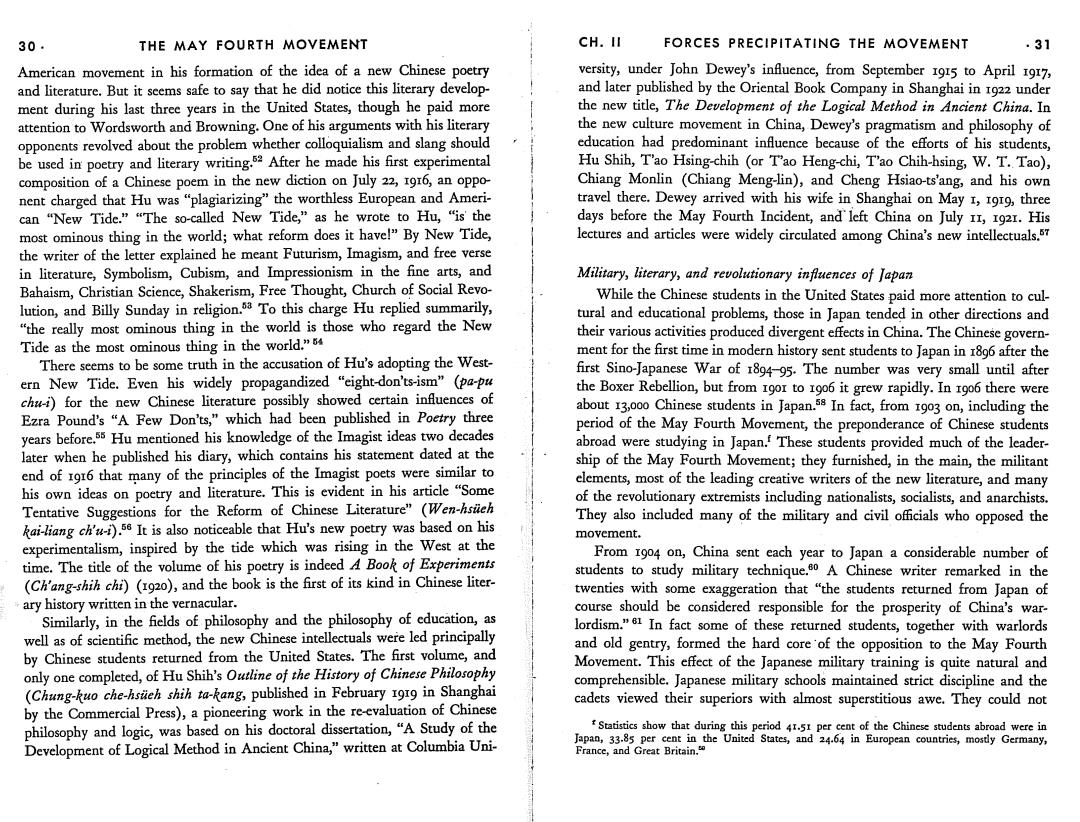
30. THE MAY FOURTH MOVEMENT CH.II FORCES PRECIPITATING THE MOVEMENT .31 American movement in his formation of the idea of a new Chinese poetry versity,under John Dewey's infuence,from September I9I5 to April I9I7, and literature.But it seems safe to say that he did notice this literary develop- and later published by the Oriental Book Company in Shanghai in 1g22 under ment during his last three years in the United States,though he paid more the new title,The Development of the Logical Method in Ancient China.In attention to Wordsworth and Browning.One of his arguments with his literary the new culture movement in China,Dewey's pragmatism and philosophy of opponents revolved about the problem whether colloquialism and slang should education had predominant influence because of the efforts of his students, be used in poetry and literary writing.After he made his first experimental Hu Shih,T'ao Hsing-chih (or Tao Heng-chi,Tao Chih-hsing,W.T.Tao), composition of a Chinese poem in the new diction on July 22,19r6,an oppo- Chiang Monlin (Chiang Meng-lin),and Cheng Hsiao-ts'ang,and his own nent charged that Hu was"plagiarizing"the worthless European and Ameri- travel there.Dewey arrived with his wife in Shanghai on May 1,19r9,three can "New Tide.”t“The so--called New Tide,”as he wrote to Hu,"is the days before the May Fourth Incident,and'left China on July II,Ig21.His most ominous thing in the world;what reform does it have!"By New Tide, lectures and articles were widely circulated among China's new intellectuals.57 the writer of the letter explained he meant Futurism,Imagism,and free verse in literature,Symbolism,Cubism,and Impressionism in the fine arts,and Military,literary,and revolutionary influences of Japan Bahaism,Christian Science,Shakerism,Free Thought,Church of Social Revo- While the Chinese students in the United States paid more attention to cul- lution,and Billy Sunday in religion.To this charge Hu replied summarily, tural and educational problems,those in Japan tended in other directions and "the really most ominous thing in the world is those who regard the New their various activities produced divergent effects in China.The Chinese govern- Tide as the most ominous thing in the world."4 ment for the first time in modern history sent students to Japan in 186 after the There seems to be some truth in the accusation of Hu's adopting the West- ern New Tide.Even his widely propagandized "eight-don'ts-ism"(pa-pu first Sino-Japanese War of 1894-95.The number was very small until after the Boxer Rebellion,but from Igor to 1go6 it grew rapidly.In 1go6 there were cht-i)for the new Chinese literature possibly showed certain influences of Ezra Pound's "A Few Don'ts,"which had been published in Poetry three about 13,000 Chinese students in Japan.ss In fact,from 1go3 on,including the period of the May Fourth Movement,the preponderance of Chinese students years before.s5 Hu mentioned his knowledge of the Imagist ideas two decades abroad were studying in Japan.These students provided much of the leader- later when he published his diary,which contains his statement dated at the ship of the May Fourth Movement;they furnished,in the main,the militant end of I9r6 that many of the principles of the Imagist poets were similar to elements,most of the leading creative writers of the new literature,and many his own ideas on poetry and literature.This is evident in his article "Some Tentative Suggestions for the Reform of Chinese Literature"(Wen-hstich of the revolutionary extremists including nationalists,socialists,and anarchists. They also included many of the military and civil officials who opposed the kai-liang ch-i).56 It is also noticeable that Hu's new poetry was based on his movement. experimentalism,inspired by the tide which was rising in the West at the From 1904 on,China sent each year to Japan a considerable number of time.The title of the volume of his poetry is indeed A Book of Experiments students to study military technique.so A Chinese writer remarked in the (Ch'angshich)(12o),and the book is the first of its kind in Chinese liter- twenties with some exaggeration that "the students returned from Japan of ary history written in the vernacular. course should be considered responsible for the prosperity of China's war- Similarly,in the fields of philosophy and the philosophy of education,as lordism."In fact some of these returned students,together with warlords well as of scientific method,the new Chinese intellectuals were led principally and old gentry,formed the hard core'of the opposition to the May Fourth by Chinese students returned from the United States.The first volume,and Movement.This effect of the Japanese military training is quite natural and only one completed,of Hu Shih's Outline of the History of Chinese Philosophy comprehensible.Japanese military schools maintained strict discipline and the (Chung-kuo che-hstich shih ta-kang,published in February 1919 in Shanghai cadets viewed their superiors with almost superstitious awe.They could not by the Commercial Press),a pioneering work in the re-evaluation of Chinese philosophy and logic,was based on his doctoral dissertation,"A Study of the Statistics show that during this period 41.5t per cent of the Chinese students abroad were in Development of Logical Method in Ancient China,"written at Columbia Uni- Japan,33.85 per cent in the United States,and 24.64 in European countries,mostly Germany, France,and Great Britain
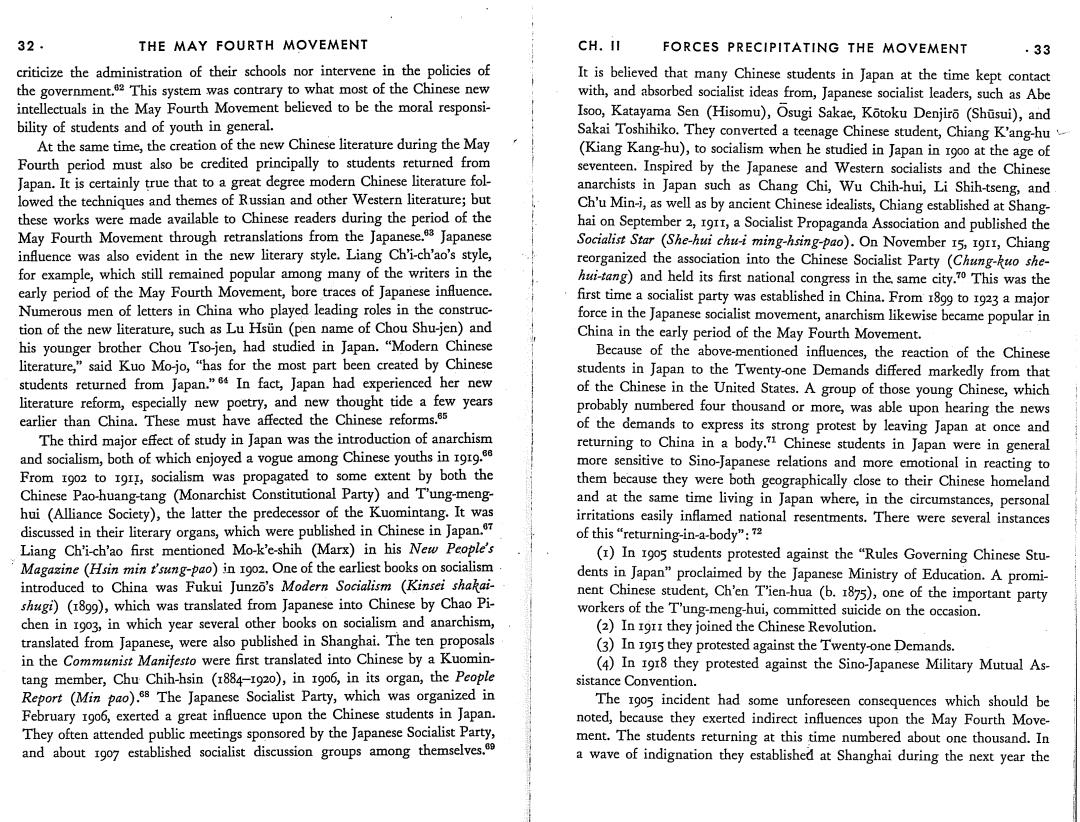
32· THE MAY FOURTH MOVEMENT CH.II FORCES PRECIPITATING THE MOVEMENT ,33 criticize the administration of their schools nor intervene in the policies of It is believed that many Chinese students in Japan at the time kept contact the government.2 This system was contrary to what most of the Chinese new with,and absorbed socialist ideas from,Japanese socialist leaders,such as Abe intellectuals in the May Fourth Movement believed to be the moral responsi- Isoo,Katayama Sen (Hisomu),Osugi Sakae,Kotoku Denjiro (Shusui),and bility of students and of youth in general. Sakai Toshihiko.They converted a teenage Chinese student,Chiang K'ang-hu At the same time,the creation of the new Chinese literature during the May (Kiang Kang-hu),to socialism when he studied in Japan in Igoo at the age of Fourth period must also be credited principally to students returned from seventeen.Inspired by the Japanese and Western socialists and the Chinese Japan.It is certainly true that to a great degree modern Chinese literature fol- anarchists in Japan such as Chang Chi,Wu Chih-hui,Li Shih-tseng,and lowed the techniques and themes of Russian and other Western literature;but Ch'u Min-i,as well as by ancient Chinese idealists,Chiang established at Shang- these works were made available to Chinese readers during the period of the hai on September 2,IgI,a Socialist Propaganda Association and published the May Fourth Movement through retranslations from the Japanese.Japanese Socialist Star (She-hui chu-i ming-hsing-pao).On November 15,1911,Chiang influence was also evident in the new literary style.Liang Ch'i-ch'ao's style, reorganized the association into the Chinese Socialist Party (Chung-kuo she- for example,which still remained popular among many of the writers in the hi-tang)and held its first national congress in the same city.0 This was the early period of the May Fourth Movement,bore traces of Japanese infuence. first time a socialist party was established in China.From 18g9 to 1923 a major Numerous men of letters in China who played leading roles in the construc- force in the Japanese socialist movement,anarchism likewise became popular in tion of the new literature,such as Lu Hsin (pen name of Chou Shu-jen)and China in the early period of the May Fourth Movement. his younger brother Chou Tso-jen,had studied in Japan."Modern Chinese Because of the above-mentioned influences,the reaction of the Chinese literature,"said Kuo Mo-jo,"has for the most part been created by Chinese students returned from Japan."In fact,Japan had experienced her new students in Japan to the Twenty-one Demands differed markedly from that literature reform,especially new poetry,and new thought tide a few years of the Chinese in the United States.A group of those young Chinese,which probably numbered four thousand or more,was able upon hearing the news earlier than China.These must have affected the Chinese reforms.95 of the demands to express its strong protest by leaving Japan at once and The third major effect of study in Japan was the introduction of anarchism returning to China in a body.Chinese students in Japan were in general and socialism,both of which enjoyed a vogue among Chinese youths in rorg. more sensitive to Sino-Japanese relations and more emotional in reacting to From Igo2 to IgI,socialism was propagated to some extent by both the them because they were both geographically close to their Chinese homeland Chinese Pao-huang-tang (Monarchist Constitutional Party)and T'ung-meng- and at the same time living in Japan where,in the circumstances,personal hui (Alliance Society),the latter the predecessor of the Kuomintang.It was irritations easily inflamed national resentments.There were several instances discussed in their literary organs,which were published in Chinese in Japan. of this"returning-in-a-body": Liang Ch'i-ch'ao first mentioned Mo-k'e-shih (Marx)in his New People's (I)In Igo5 students protested against the "Rules Governing Chinese Stu- Magazine (Hsin min t'sung-pao)in 1go2.One of the earliest books on socialism dents in Japan"proclaimed by the Japanese Ministry of Education.A promi- introduced to China was Fukui Junzo's Modern Socialism (Kinsei shakai- sgi)(18),which was translated from Japanese into Chinese by Chao Pi- nent Chinese student,Ch'en T'ien-hua (b.1875),one of the important party chen in 1go3,in which year several other books on socialism and anarchism, workers of the T'ung-meng-hui,committed suicide on the occasion. (2)In rorI they joined the Chinese Revolution. translated from Japanese,were also published in Shanghai.The ten proposals (3)In I9I5 they protested against the Twenty-one Demands. in the Communist Manifesto were first translated into Chinese by a Kuomin- (4)In 198 they protested against the Sino-Japanese Military Mutual As- tang member,Chu Chih-hsin (1884-1920),in 19o6,in its organ,the Pcople sistance Convention. Report (Min pao).s8 The Japanese Socialist Party,which was organized in The 1go5 incident had some unforeseen consequences which should be February 16,exerted a great influence upon the Chinese students in Japan. noted,because they exerted indirect influences upon the May Fourth Move- They often attended public meetings sponsored by the Japanese Socialist Party, ment.The students returning at this time numbered about one thousand.In and about 1go7 established socialist discussion groups among themselves. a wave of indignation they established at Shanghai during the next year the
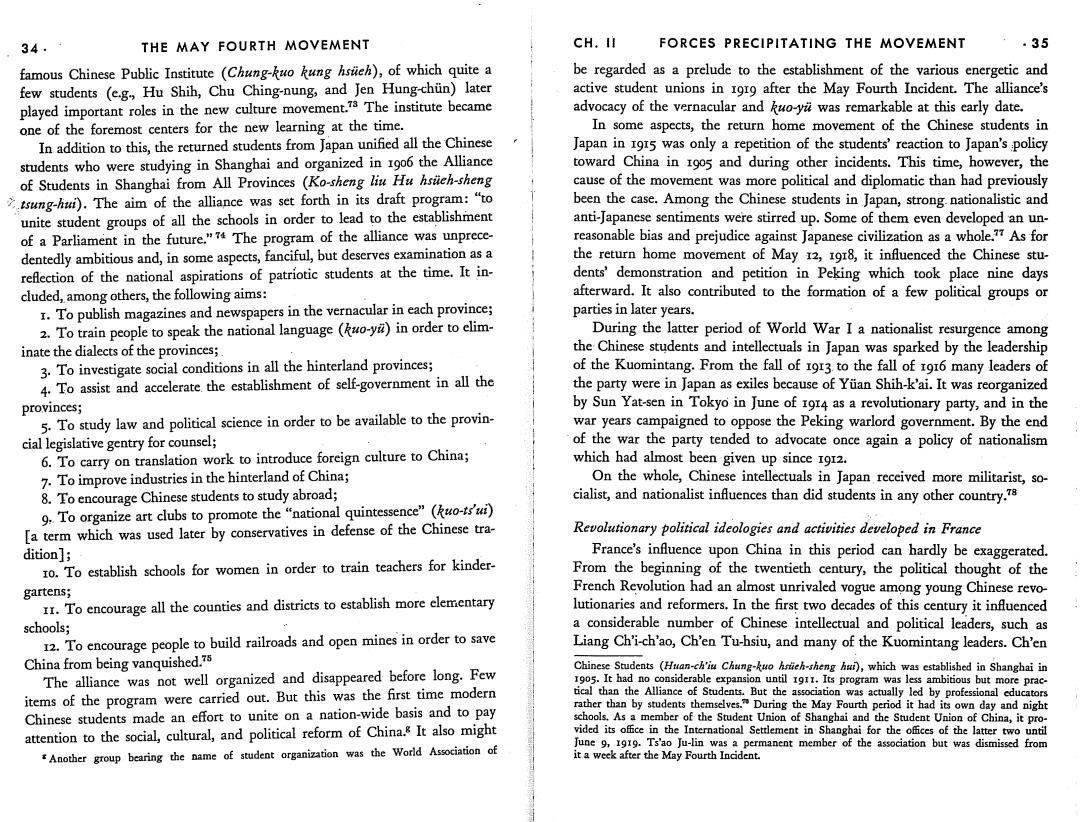
34· THE MAY FOURTH MOVEMENT CH.II FORCES PRECIPITATING THE MOVEMENT .35 famous Chinese Public Institute (Chung-kuo kung hstich),of which quite a be regarded as a prelude to the establishment of the various energetic and few students (e.g,Hu Shih,Chu Ching-nung,and Jen Hung-chin)later active student unions in Iorg after the May Fourth Incident.The alliance's played important roles in the new culture movement.73 The institute became advocacy of the vernacular and kuo-yi was remarkable at this early date. one of the foremost centers for the new learning at the time. In some aspects,the return home movement of the Chinese students in In addition to this,the returned students from Japan unified all the Chinese Japan in IgI5 was only a repetition of the students'reaction to Japan's policy students who were studying in Shanghai and organized in 1o6 the Alliance toward China in 1go5 and during other incidents.This time,however,the of Students in Shanghai from All Provinces (Ko-sheng lit Hu hstich-sheng cause of the movement was more political and diplomatic than had previously tsung-hti).The aim of the alliance was set forth in its draft program:"to been the case.Among the Chinese students in Japan,strong.nationalistic and unite student groups of all the schools in order to lead to the establishment anti-Japanese sentiments were stirred up.Some of them even developed an un- of a Parliament in the future."The program of the alliance was unprece- reasonable bias and prejudice against Japanese civilization as a whole.As for dentedly ambitious and,in some aspects,fanciful,but deserves examination as a the return home movement of May 12,1918,it influenced the Chinese stu- reflection of the national aspirations of patriotic students at the time.It in- dents'demonstration and petition in Peking which took place nine days cluded,among others,the following aims: afterward.It also contributed to the formation of a few political groups or 1.To publish magazines and newspapers in the vernacular in each province; parties in later years. 2.To train people to speak the national language (ko-y)in order to elim- During the latter period of World War I a nationalist resurgence among inate the dialects of the provinces;. the Chinese students and intellectuals in Japan was sparked by the leadership 3.To investigate social conditions in all the hinterland provinces; of the Kuomintang.From the fall of or3 to the fall of 1916 many leaders of 4.To assist and accelerate.the establishment of self-government in all the the party were in Japan as exiles because of Yuian Shih-k'ai.It was reorganized provinces; by Sun Yat-sen in Tokyo in June of I9r4 as a revolutionary party,and in the 5.To study law and political science in order to be available to the provin- war years campaigned to oppose the Peking warlord government.By the end cial legislative gentry for counsel; of the war the party tended to advocate once again a policy of nationalism 6.To carry on translation work to introduce foreign culture to China; which had almost been given up since I9Iz. 7.To improve industries in the hinterland of China; On the whole,Chinese intellectuals in Japan received more militarist,so- 8.Toencourage Chinese students to study abroad; cialist,and nationalist influences than did students in any other country.8 9.To organize art clubs to promote the "national quintessence"(o-s) [a term which was used later by conservatives in defense of the Chinese tra- Revolutionary political ideologies and activities developed in France dition]; France's influence upon China in this period can hardly be exaggerated. 1o.To establish schools for women in order to train teachers for kinder- From the beginning of the twentieth century,the political thought of the gartens; French Revolution had an almost unrivaled vogue among young Chinese revo- II.To encourage all the counties and districts to establish more elementary lutionaries and reformers.In the first two decades of this century it influenced schools; a considerable number of Chinese intellectual and political leaders,such as 12.To encourage people to build railroads and open mines in order to save Liang Ch'i-ch'ao,Ch'en Tu-hsiu,and many of the Kuomintang leaders.Ch'en China from being vanquished. The alliance was not well organized and disappeared before long.Few Chinese Students (Huan-ch'iu Chung-kuo hstieh-sheng hui),which was established in Shanghai in 1905.It had no considerable expansion until I91.Its program was less ambitious but more prac- items of the program were carried out.But this was the first time modern tical than the Alliance of Students.But the association was actually led by professional educators Chinese students made an effort to unite on a nation-wide basis and to pay rather than by students themselves."During the May Fourth period it had its own day and night schools.As a member of the Student Union of Shanghai and the Student Union of China,it pro- attention to the social,cultural,and political reform of China.It also might vided its office in the International Settlement in Shanghai for the ofces of the latter two until Another group bearing the name of student organization was the World Association of June 9,1919.Ts'ao Ju-lin was a permanent member of the association but was dismissed from it a week after the May Fourth Incident
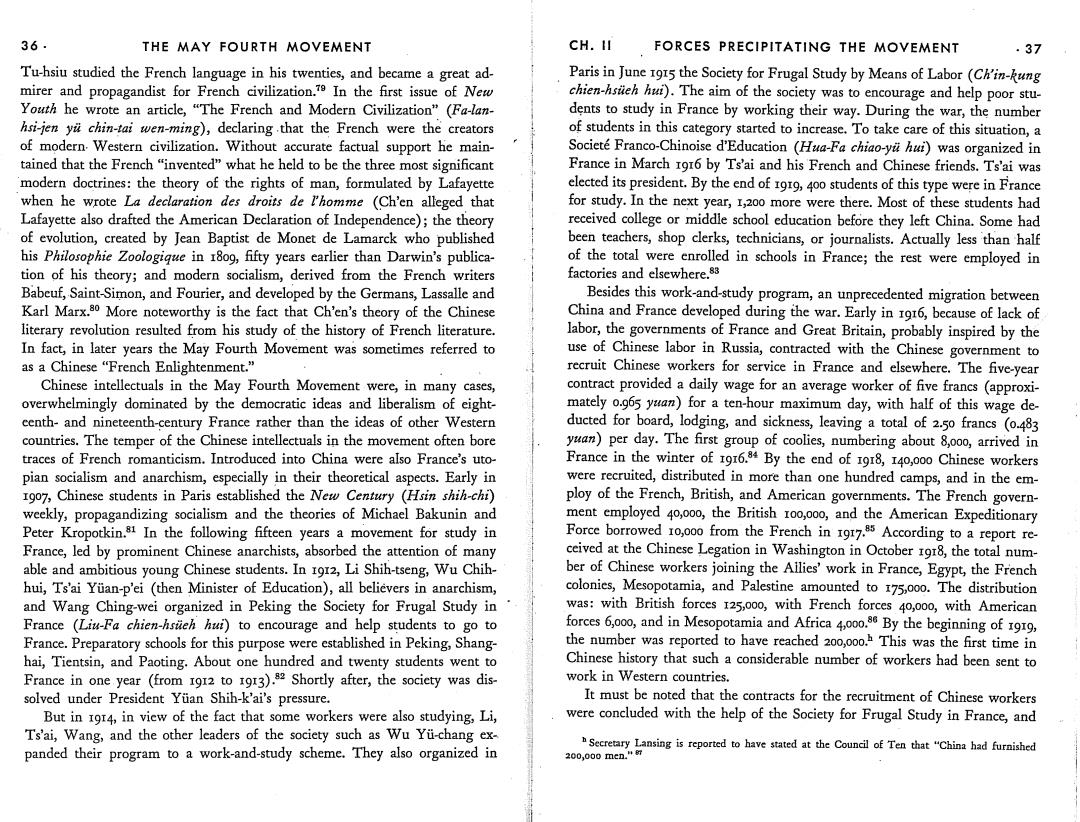
36. THE MAY FOURTH MOVEMENT CH.II FORCES PRECIPITATING THE MOVEMENT ·37 Tu-hsiu studied the French language in his twenties,and became a great ad- Paris in June 19I5 the Society for Frugal Study by Means of Labor(Ch'in-kung mirer and propagandist for French civilization.79 In the first issue of New chien-hstieh hui).The aim of the society was to encourage and help poor stu- Youth he wrote an article,"The French and Modern Civilization"(Fa-lan- dents to study in France by working their way.During the war,the number hsi-jen yii chin-tai wen-ming),declaring that the French were the creators of students in this category started to increase.To take care of this situation,a of modern.Western civilization.Without accurate factual support he main- Societe Franco-Chinoise d'Education (Hua-Fa chiao-yii hui)was organized in tained that the French"invented"what he held to be the three most significant France in March ror6 by Ts'ai and his French and Chinese friends.Ts'ai was modern doctrines:the theory of the rights of man,formulated by Lafayette elected its president.By the endof00 students of this type were inFrance when he wrote La declaration des droits de Ihomme (Ch'en alleged that for study.In the next year,I,200 more were there.Most of these students had Lafayette also drafted the American Declaration of Independence);the theory received college or middle school education before they left China.Some had of evolution,created by Jean Baptist de Monet de Lamarck who published been teachers,shop clerks,technicians,or journalists.Actually less than half his Philosophie Zoologiqe in 189,fifty years carlier than Darwin's publica- of the total were enrolled in schools in France;the rest were employed in tion of his theory;and modern socialism,derived from the French writers factories and elsewhere. Babeuf,Saint-Simon,and Fourier,and developed by the Germans,Lassalle and Besides this work-and-study program,an unprecedented migration between Karl Marx.0 More noteworthy is the fact that Ch'en's theory of the Chinese China and France developed during the war.Early in 1g16,because of lack of literary revolution resulted from his study of the history of French literature. labor,the governments of France and Great Britain,probably inspired by the In fact,in later years the May Fourth Movement was sometimes referred to use of Chinese labor in Russia,contracted with the Chinese government to as a Chinese "French Enlightenment." recruit Chinese workers for service in France and elsewhere.The five-year Chinese intellectuals in the May Fourth Movement were,in many cases, contract provided a daily wage for an average worker of five francs (approxi- overwhelmingly dominated by the democratic ideas and liberalism of eight- mately 0.965 yuan)for a ten-hour maximum day,with half of this wage de- centh-and nineteenth-century France rather than the ideas of other Western ducted for board,lodging,and sickness,leaving a total of 2.50 francs (0.483 countries.The temper of the Chinese intellectuals in the movement often bore yuan)per day.The first group of coolies,numbering about 8,000,arrived in traces of French romanticism.Introduced into China were also France's uto- France in the winter of 1916.34 By the end of 19r8,140,000 Chinese workers pian socialism and anarchism,especially in their theoretical aspects.Early in were recruited,distributed in more than one hundred camps,and in the em- 19o7,Chinese students in Paris established the New Century (Hsin shih-chi) ploy of the French,British,and American governments.The French govern- weekly,propagandizing socialism and the theories of Michael Bakunin and ment employed 40,000,the British roo,o00,and the American Expeditionary Peter Kropotkin.In the following fifteen years a movement for study in Force borrowed 1o,00o from the French in 117.5 According to a report re- France,led by prominent Chinese anarchists,absorbed the attention of many ceived at the Chinese Legation in Washington in October 1or8,the total num- able and ambitious young Chinese students.In 19I2,Li Shih-tseng,Wu Chih- ber of Chinese workers joining the Ailies'work in France,Egypt,the French hui,Ts'ai Yuan-p'ei (then Minister of Education),all believers in anarchism, colonies,Mesopotamia,and Palestine amounted to 175,000.The distribution and Wang Ching-wei organized in Peking the Society for Frugal Study in was:with British forces 125,000,with French forces 40,000,with American France (Liu-Fa chien-hstieh hui)to encourage and help students to go to forces 6,000,and in Mesopotamia and Africa 4000 By the beginning of France.Preparatory schools for this purpose were established in Peking,Shang- the number was reported to have reached 200,000.This was the first time in hai,Tientsin,and Paoting.About one hundred and twenty students went to Chinese history that such a considerable number of workers had been sent to France in one year (from IgI2 to IgI3).32 Shortly after,the society was dis- work in Western countries. solved under President Yuan Shih-k'ai's pressure. It must be noted that the contracts for the recruitment of Chinese workers But in I9r4,in view of the fact that some workers were also studying,Li, were concluded with the help of the Society for Frugal Study in France,and Ts'ai,Wang,and the other leaders of the society such as Wu Yu-chang ex- panded their program to a work-and-study scheme.They also organized in Secretary Lansing is reported to have stated at the Council of Ten that"China had furnished 200,000mcn."解